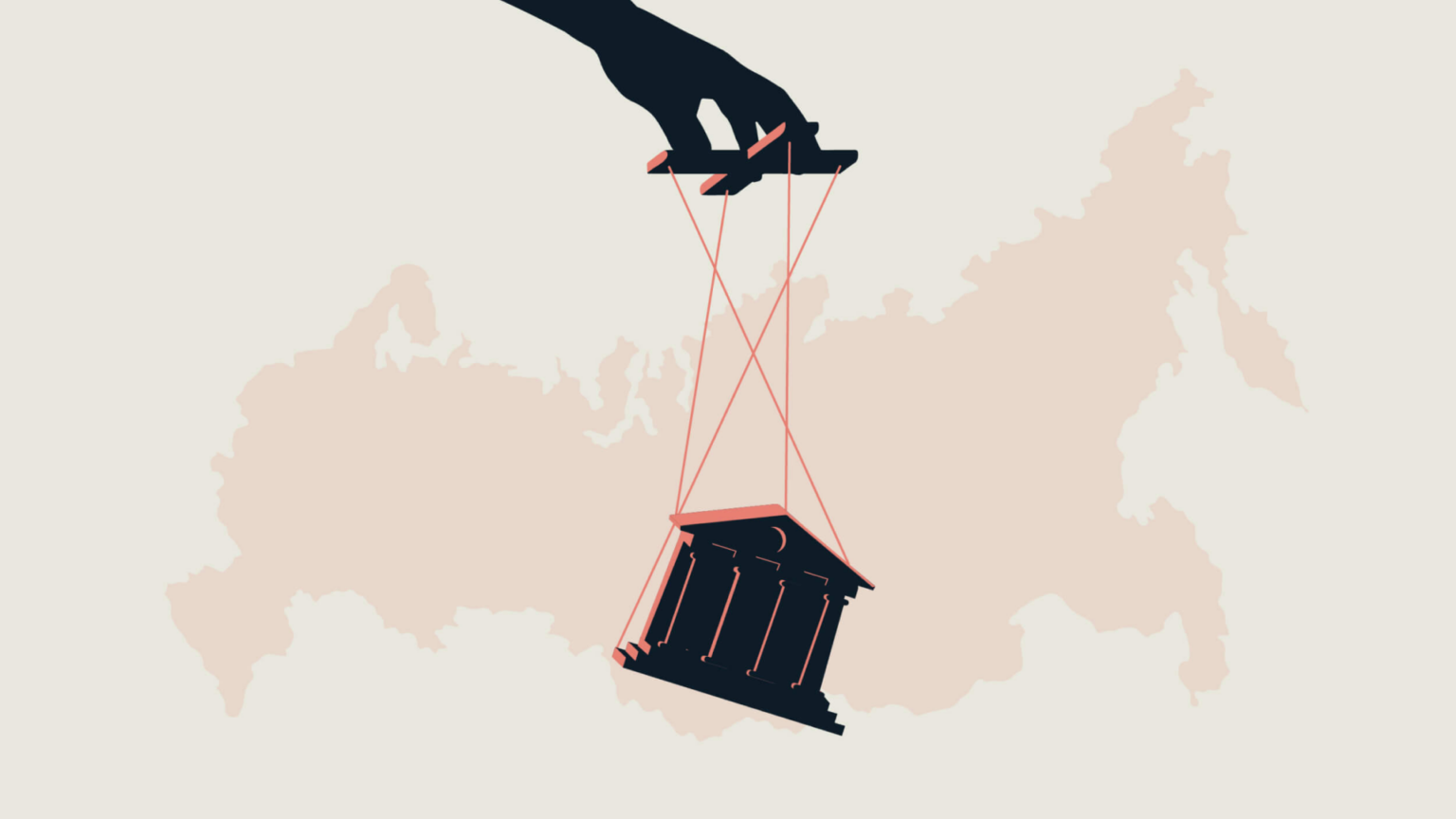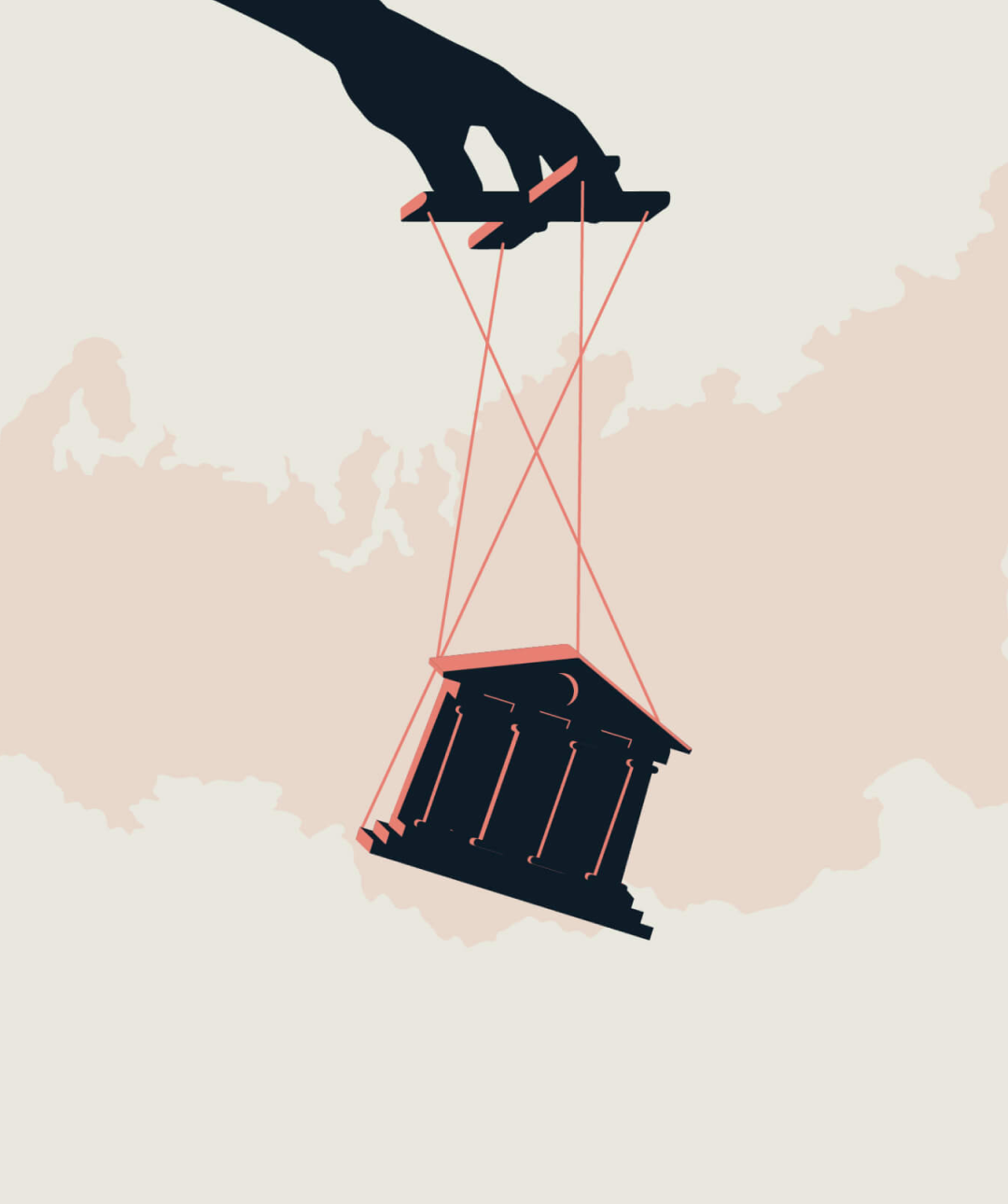

By Julia Kepczynska
Illustrations by Lucian French, designer
From Tsarism to the modern era, Russian leaders have attempted to mold the nation’s judiciary for their own gain and employ it as a weapon against their political opponents. In today’s Russia, this is evident by laws that limit anti-government demonstrations and criminalize anti-war speech.
The Kremlin’s iron grip on the judicial system dates back to Soviet times. Communist justice was averse to the idea of “innocent until proven guilty.” Instead, individuals charged with crimes were almost always convicted, and sentences were seldom overturned. Courts served the interests of the state and were subordinate to the Communist Party, dutifully carrying out their political concerns and personal whims.
During the period known as the Great Terror, Stalin employed legal means to eliminate opposition and consolidate his power. An article in the criminal code outlawed “anti-Soviet” behavior, a purposely vague and ambiguous provision lacking any clear definition. This allowed officials to interpret and label any action as anti-Soviet, leading to the prosecution, execution, imprisonment in labor camps (the Gulag), or starvation of millions of Soviet citizens under Stalin’s rule. This period also saw the prevalence of the People’s Commissariat for Internal Affairs (NKVD) Troika, administrative and extrajudicial bodies tasked with carrying out the repression of “anti-Soviet” elements, active from August 1937 to November 1938. The bodies consisted of three officials: the chief, the secretary of the Regional Committee, and the prosecutor (hence, “troika”). They issued sentences to individuals after simplified, expedited investigations, with both trials and convictions carried out in complete secrecy. During these proceedings, defendants were usually barred from counsel, and convictions rarely included evidentiary or incriminating detail. Further, stringent state quotas on Gulag prisoners and executions meant that sentences were typically predetermined before the trials even began.
Following Stalin’s death, subsequent Soviet rulers abandoned the policy of mass terror but continued with political arrests, albeit on a smaller scale. Many trials were conducted behind closed doors, and although the accused formally had the right to legal representation, the independence of the Soviet bar was severely limited by the control of government agencies. After assuming power, Mikhail Gorbachev attempted to introduce reforms to the legal system. In 1989, he changed the judicial selection process, eliminating the longstanding practice of party-appointed judges. He also implemented a jury system for the most serious criminal cases. These reforms aimed to improve the existing system rather than completely dismantling and rebuilding it, but were implemented haphazardly.
After the dissolution of the USSR, Boris Yeltsin, Russia’s first president, supported a comprehensive overhaul of the judiciary. This led to significant changes in the legal profession, allowing lawyers to establish their own firms and specialize in various areas of law. In 1991, a constitutional court was created, and the newly adopted Russian constitution established a novel legal system. Judicial review was introduced for the first time, empowering the constitutional court to declare legislative and executive acts unconstitutional. The 1991 reforms also called for the development of adversarial trials to provide more independence to judges and separate them from the role of prosecutors. In 1996, Russia joined the Council of Europe (CoE), granting Russian citizens the right to appeal decisions of domestic courts before the European Court of Human Rights (ECtHR) after exhausting all national legal remedies (Russia left the Council in March 2022, less than a month after it invaded Ukraine). However, Yeltsin, like his predecessor, continued to target opponents through the court system. Additionally, the rise of the oligarchs brought about the widespread practice of bribing judges and influencing legal outcomes.
In modern-day Russia, under Vladimir Putin’s authoritarian regime, courts serve merely as a tool used by the Kremlin to target critics and stifle dissent. Putin, who’s opposed to democratic processes and values, has been expanding his powers ever since he came to power in 2000, oftentimes using Russia’s frail and nascent judiciary as a tool to target his opponents.
In 2003, the Russian government arrested Mikhail Khodorkovsky — an oligarch who crossed Putin by financing opposition parties, Russia’s civil society groups uncontrolled by the Kremlin, and openly criticizing Putin for rampant corruption in the system. To independent observers, it was obvious that the case against Khodorkovsky was politically motivated: officials claimed he was suspected of fraud and tax evasion, yet during the Yukos case in 2004, as it came to be known, only two out of the seven charges levied against him concerned tax evasion. The court would also repeatedly turn down the defense’s motions, and officials arrested lawyers working for Khodorkovsky. In the end, both Khodorkovsky and his associate, Platon Lebedev, were sentenced to nine years in prison. The message was clear: in Putin’s Russia, courts are meant to do the bidding on behalf of the government, just like in Stalin’s USSR.
Another glaring example of the weaponization of Russia’s judiciary was the arrest of tax auditor Sergei Magnitsky, known for his investigation exposing corruption by Russian officials while representing his then-clients, Bill Browder and Hermitage Capital. Magnitsky alleged widespread theft from the Russian state during the period of rapid privatization, all of which was sanctioned and carried out by the Kremlin. In turn, Putin used the courts to retaliate.
In November 2008, Magnitsky was arrested and imprisoned at the notorious Butyrka prison on spurious charges. He was detained for 11 months without trial, denied family visits, and “forced into increasingly squalid cells.” Magnitsky developed a slew of deteriorating health conditions, for which he was given no medical care, including a life-saving surgery that was never performed. Magnitsky, after whom the revolutionary targeted sanctions regime was named, died on Nov. 16, 2009, just eight days before he would’ve had to be released under the law if he had not yet stood trial.
In January 2022, in Nizhny Novgorod, several armed men broke into the apartment of Saidi Yangulbaev — a former judge of the Chechen Supreme Court — and kidnapped his wife, Zarema Musayeva. The 59-year-old woman, who suffers from diabetes, was then forcefully taken to Chechnya, hundreds of miles away. Chechen ruler Ramzan Kadyrov stated that the entire Yangulbaev family needed to be eradicated. The true motive for her public kidnapping was the criticism of Kadyrov by her sons, Abubakar, Baysangur, and Ibragim. Saidi Yangulbaev fled the country with his daughter a few days later due to threats against him and his family. Despite a brazen attack on a judge’s family, Russian officials did not respond to the incident; instead, the Kremlin called it “strange” and “unconfirmed.” Dmitry Peskov, Putin’s spokesman, even expressed confidence in Chechen law enforcement and stated that the Kremlin prefers “not to believe just such reports.” In July of this year, Musayeva was sentenced to 5.5 years in prison for “fraud and assaulting the authorities.”
This blatant disregard for the safety and autonomy of judges highlights Putin’s true attitude toward the justice system in the country. As long as judges go hand in hand with the government’s decisions, they’re safe to operate; but the moment they cross the line and show a hint of independence, they’re no longer welcome in the system.
Julia Kepczynska is a legal and policy intern at the Human Rights Foundation, covering Eastern Europe and former Soviet Republics.
Join us in helping save lives and stand up to tyranny.

Reach out with any questions or support needs.
Become part of our mission-driven team.
Find answers to commonly asked questions in our FAQs.
Hit enter to search or ESC to close